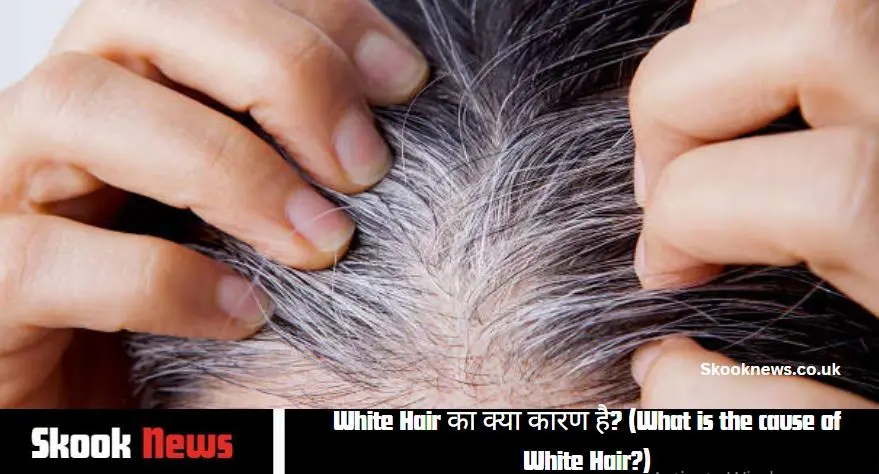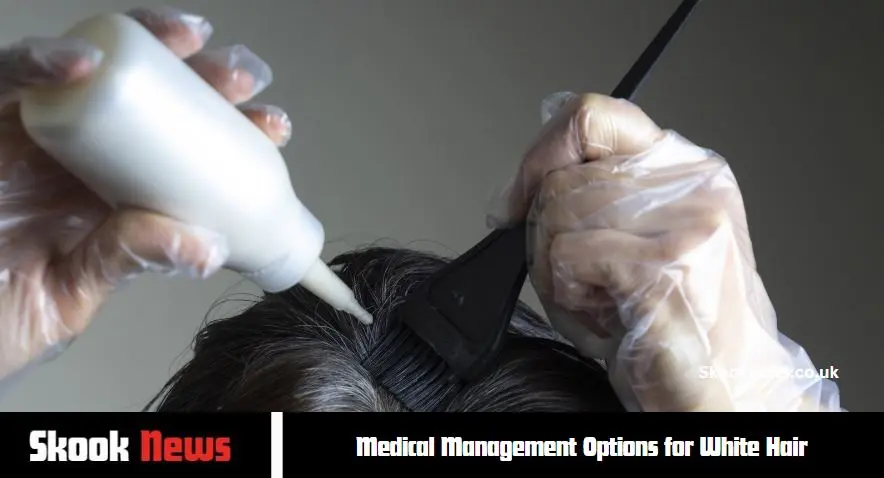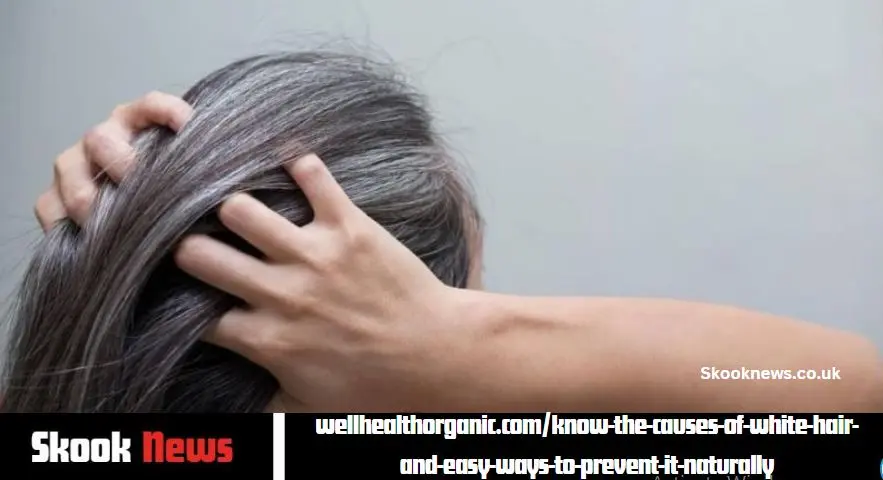Well, Health Organic’s informative webpage offers valuable insights into the causes of white hair and natural methods to prevent it. Often due to aging and genetics, white hair can also be influenced by factors such as stress, nutritional deficiencies, and lifestyle choices. The website delves into these causes, emphasizing how stress accelerates the graying process by affecting melanin production. It also highlights how inadequate nutrition, particularly deficiencies in vitamins B12, B6, and folic acid, can contribute to premature graying.
The site’s prevention strategies focus on natural approaches, promoting a holistic approach to hair care. Suggestions include dietary adjustments to ensure adequate intake of essential nutrients, such as increasing consumption of antioxidant-rich foods and incorporating hair-healthy vitamins and minerals into daily meals. Additionally, the website advocates stress management techniques like meditation, yoga, and adequate sleep as crucial steps in maintaining hair health and preventing premature graying.
Overall, Well Health Organic provides a comprehensive resource for understanding the causes of white hair and offers practical, natural solutions to help individuals maintain healthy and vibrant hair throughout their lives.
What causes white hair at a young age?
White hair at a young age, also known as premature graying, can be caused by several factors:
- Genetics: Family history plays a significant role. If your parents or grandparents experienced premature graying, you are also more likely to.
- Hormonal Changes: Hormonal imbalances, such as thyroid disorders or changes during puberty, pregnancy, or menopause, can contribute to premature graying.
- Nutritional Deficiencies: Deficiencies in essential vitamins and minerals, particularly vitamin B12, iron, copper, and zinc, can affect melanin production and lead to premature graying.
- Oxidative Stress: Environmental factors, pollution, smoking, and UV radiation can generate oxidative stress in the body, damaging melanocytes responsible for hair color.
- Autoimmune Conditions: Certain autoimmune diseases, such as vitiligo and alopecia areata, can cause pigment loss in hair follicles, leading to premature graying.
- Medical Conditions: Chronic illnesses, like anemia or chronic stress, can impact overall health and accelerate the aging process, including premature graying.
- Ethnicity: Some ethnic groups may be more prone to premature graying due to genetic predispositions and differences in hair biology.
- Lifestyle Factors: Poor diet, excessive stress, lack of sleep, and unhealthy habits like smoking or excessive alcohol consumption can contribute to premature graying.
- Chemical Exposure: Overuse of chemical-based hair treatments, frequent dyeing, and exposure to harsh hair products can damage hair follicles and contribute to premature graying.
- Psychological Factors: Emotional stress and psychological trauma have been linked to premature graying, although the exact mechanisms are still being studied.
Understanding these factors can help individuals take preventive measures and adopt lifestyle changes to promote healthy hair and potentially delay the onset of premature graying. Consulting a healthcare professional or dermatologist can provide personalized advice and treatment options if concerned about premature graying.
White Hair का क्या कारण है? (What is the cause of White Hair?)

Hair growth occurs when new cells push old cells out of the hair follicle. This happens in three phases – growth (anagen), cessation (catagen), and rest (telogen). During the rest phase, your hair reaches its lifespan and falls out, allowing a new strand to grow. Melanin, created by melanocytes produce hair color. Unlike skin, hair does not maintain pigment consistently.
In the anagen phase, hair actively gains pigment. In the catagen phase, pigment decreases, and in the telogen phase, it is absent.
As age progresses, each hair strand injects less pigment, causing it to turn gray and eventually white.
White hair starts due to the following reasons:
Genes: Dr. says, “Genes primarily determine the age at which your hair loses pigment.” For some, this can happen before age 20, while for others, the first signs of gray may appear later.
Melanin Deficiency: In most cases, a lack of melanin is the primary cause of hair turning white. Melanin production depends on adequate nutrition and protein intake; deficiencies in these nutrients can significantly lower melanin levels.
Hormones: Research indicates that hormonal imbalance can trigger or exacerbate premature graying. If your hair is graying excessively and you’re unsure about hormonal imbalance, consult a doctor.
Smoking: Studies have shown that smoking is one of the significant factors contributing to premature graying. Reactive oxygen species from smoking damage melanocytes in the hair follicle, leading to premature white hair.
Deficiency in Vitamins and Minerals: Deficiencies in iron, vitamin D, folate, vitamin B12, and selenium can also cause hair to turn white prematurely. Low levels of biotin, vitamin B12, and folic acid were found in people experiencing premature graying.
Stress: Emotional stress also plays a role here. Studies have shown that oxidative stress caused by psychological stress can be a cause of premature graying. Stress can also be a cause of hair loss before the time.
Chemicals: Often, chemical-based shampoos, soaps, hair dyes, etc., can directly cause this problem. However, it can also result from some allergic infections.
Natural remedies to reduce white hair. Natural Remedies To Reduce White Hair
Here are some natural remedies that may help reduce white hair:
- Amla (Indian Gooseberry): Amla is rich in antioxidants and vitamin C, which can help prevent premature graying of hair. You can consume it fresh, as juice, or in powdered form.
- Curry Leaves: Curry leaves are rich in vitamins B and C, which nourish the hair follicles and help restore natural hair color. Please include them in your diet or apply them as a paste to the scalp.
- Coconut Oil and Lemon Juice: Mix coconut oil with lemon juice and apply it to the scalp regularly. This combination helps nourish the hair follicles and prevent premature graying.
- Onion Juice: Due to its high sulfur content, onion juice is believed to promote hair growth and prevent premature graying. Apply onion juice to the scalp and leave it for 30 minutes before rinsing.
- Henna: Henna is a natural hair dye that covers gray hair and strengthens and conditions the hair. Regular use of henna can help maintain a natural hair color.
- Black Tea: Black tea contains antioxidants that can help darken hair and prevent premature graying. Brew black tea, let it cool, and use it as a rinse after shampooing.
- Rosemary and Sage: Boil rosemary and sage in water, let it cool, and use it as a hair rinse. Both herbs are known for their darkening properties and can help maintain hair color.
- Almond Oil: Massaging almond oil into the scalp and hair can help nourish the hair follicles and prevent premature graying.
- Healthy Diet: Ensure your diet includes foods rich in vitamins and minerals like iron, vitamin B12, and zinc, which are essential for maintaining hair health and color.
- Stress Management: Practice stress-reducing techniques such as yoga, meditation, or regular exercise. Chronic stress can contribute to premature hair graying.
These natural remedies can complement each other and may help slow the progression of white hair. However, results may vary, and it’s essential to consult a healthcare provider for persistent issues or underlying health concerns.
May You Also Like It:
Wellhealthorganic.com/easily-remove-dark-spots-lemon-juice Guide
wellhealthorganic.com: to increase immunity include winter foods in your diet health tips in Hindi
Wellhealthorganic.com – eat your peels – unlocking the nutritional benefits
Thesparkshop.in-product – bear-design-long-sleeve-baby-jumpsuit
Wellhealthorganic Vitamin B12 – Complete Guide
Tips to reduce white hair
Reducing white hair involves lifestyle changes, proper hair care, and natural remedies. Here are some tips to help reduce white hair:
- Balanced Diet: Ensure your diet includes plenty of fruits, vegetables, whole grains, lean proteins, and healthy fats. Include foods rich in antioxidants, vitamins (especially B-complex), and minerals like iron and zinc.
- Amla (Indian Gooseberry): Incorporate amla into your diet or use it topically. It is rich in vitamin C and antioxidants, which help maintain hair health and prevent premature graying.
- Healthy Hair Practices: Avoid excessive heat styling, chemical treatments, and harsh hair products. Protect your hair from environmental damage and use a wide-toothed comb to minimize breakage.
- Manage Stress: Chronic stress can contribute to premature graying. Practice stress-relieving activities such as yoga, meditation, deep breathing exercises, or hobbies you enjoy.
- Quit Smoking: Smoking can accelerate the aging process, including premature graying of hair. Quitting smoking can positively impact overall health, including hair health.
- Regular Scalp Massage: Massaging the scalp with essential oils like coconut oil, almond oil, or olive oil can improve blood circulation to the hair follicles, promoting healthier hair growth.
- Herbal Rinses: Use herbal rinses like rosemary, sage, or black tea to darken hair naturally and slow down the appearance of white hair.
- Stay Hydrated: Drink plenty of water throughout the day to keep your body and hair hydrated. Dehydration can affect hair health and contribute to premature graying.
- Avoid Chemical Hair Products: Limit chemical-based shampoos, hair dyes, and styling products. Opt for natural and gentle alternatives whenever possible.
- Consult a Healthcare Professional: If you notice sudden or excessive graying, or if it runs in your family, consult a healthcare professional or dermatologist for advice and appropriate treatment options.
Adopting these tips and maintaining a healthy lifestyle can support your hair health and potentially slow down the progression of white hair.
Medical Management Options for White Hair

Managing white hair medically typically involves cosmetic approaches rather than reversing the underlying cause of graying. Here are some medical management options for white hair:
- Hair Dyes: The most common and effective method to cover white hair is using hair dyes. These dyes contain chemicals that deposit color onto the hair shaft, covering gray or white hair.
- Topical Treatments: Some topical treatments claim to restore pigment to hair follicles, although their effectiveness is debated. These treatments may contain peptides, vitamins, or plant extracts to stimulate melanin production.
- Melanocyte Activation Therapy: Experimental treatments involving the activation or transplantation of melanocytes (cells that produce melanin) into hair follicles are being researched for their potential to restore natural hair color.
- Nutritional Supplements: Supplements containing vitamins and minerals essential for hair health, such as vitamin B12, biotin, and copper, may support overall hair quality but are unlikely to reverse gray hair once it has occurred.
- Consultation with Dermatologist: A dermatologist can assess your situation, discuss medical options, and guide you on the safest and most effective treatments for managing white hair.
It’s important to note that while these options can help manage the appearance of white hair, they do not address the fundamental cause of graying. White hair typically results from aging and genetic factors, and reversing this process remains a challenge in medical science.
Frequently Asked Questions
What causes white hair?
White hair is primarily caused by decreased melanin production in hair follicles, often due to genetics, aging, stress, or nutritional deficiencies.
Can white hair be prevented naturally?
Yes, natural methods such as maintaining a healthy diet rich in vitamins and minerals, reducing stress, using herbal treatments like amla and curry leaves, and avoiding harsh chemicals can help prevent premature graying.
Is premature graying reversible?
While reversing gray hair may be impossible, adopting healthy lifestyle habits and using natural remedies may help slow down or prevent further graying.
How does stress contribute to white hair?
Stress can accelerate aging, including premature graying, by affecting hormone levels and reducing melanin production in hair follicles.
Are there any side effects of using natural remedies for white hair?
Natural remedies generally have fewer side effects compared to chemical treatments. However, individual sensitivities may vary, so testing a small area before widespread use is advisable.
Can diet affect hair color?
A balanced diet rich in antioxidants, vitamins (especially B-complex), and minerals like iron and zinc can support hair health and help maintain natural hair color.
Are there alternative treatments for preventing white hair?
In addition to natural remedies, alternative treatments such as acupuncture or specific herbal supplements are sometimes suggested, though their efficacy varies.
When should I consult a healthcare professional about white hair?
It’s advisable to consult a healthcare professional if you experience sudden or excessive graying, have concerns about underlying health conditions, or if premature graying runs in your family.
Conclusion
As you age, your hair follicles undergo aging as well. This aging process reduces their ability to produce color, resulting in decreased melanin and pigment in the hair, which appears gray or white. If you prefer to maintain colored hair, there are various solutions available. Many proponents of natural healing advocate for home remedies to address gray hair.
However, it’s important to note that these natural approaches have yet to be extensively studied clinically to determine their effectiveness. Additionally, some individuals may have allergies to specific home remedies. Therefore, before trying any home remedy to alter your hair color, it’s advisable to consult your doctor. Your doctor can provide valuable insights based on your current health status, medications you may be taking, and other factors, helping you understand how a home remedy might impact you personally.
You may also like it:
What is Intrepidfood.eu? Everything You Need To Know
Ztec100.com Tech Health and Insurance

